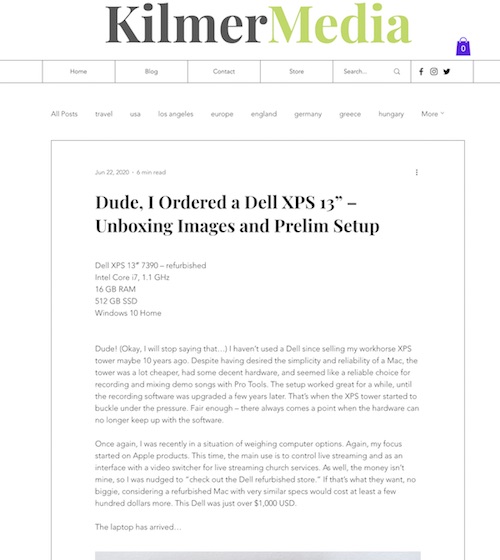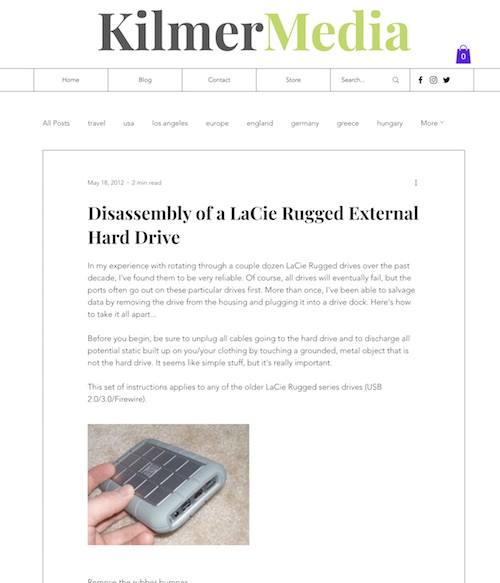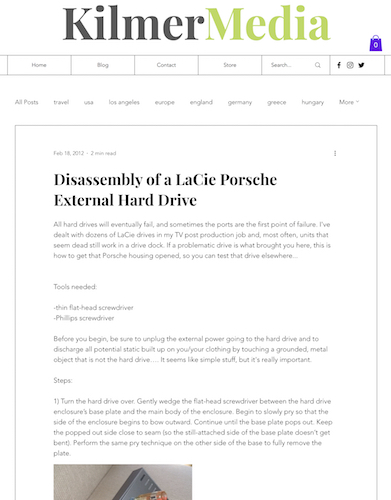This post detailing the unboxing, setup, and initial thoughts about a Dell XPS 13″ laptop has moved to my new site in 2022: The post is the same but now officially lives here instead:
https://www.kilmermedia.net/post/tech-review-dell-xps-13-unboxing-setup-using-testing
This post has moved to my new site in 2022. Click the link or screenshot below to access the same helpful info, just at a new home:
https://www.kilmermedia.net/post/tech-disassembly-of-logitech-z-10-speakers
Celebrity and the Allure of Twitter
08/20/2012
Los Angeles, 2012. In this town, so many people have to be careful what they say. They have to be careful about what they do and where they go. Privacy is at an all-time low and sometimes, by association, you could end up on some shutterbug’s camera and in the tabloids. That happened to me. No one claimed I did anything, but rather, the story was about the person standing next to me. Below is a screen-grab from a scrolling graphic that appeared on the tabloid show “The Insider” a couple years ago. That’s me in the white shirt.
Popping up in the media here and there is fun, but the appeal quickly vanishes when people become interested in everything you do. I know this because I work with famous people everyday. Some of them are withdrawn in their personal lives, and some of them will walk around The Grove, wearing a hat that advertises the show they star on. When they do that, it’s because they genuinely enjoy people. It’s like an invitation for people to say “Hey, I love your work….your character is so funny….you seem like a cool guy.” That’s a lot different than trying to find appreciation for paparazzi out on the sidewalk, trying to take a picture through your kitchen window at 3 AM.
With a little research, you can probably figure out who the star next to me in the photo above is/was. She was not happy at all about the photog staked out across the street. That hat she is holding in front of her face is mine, and we could hear the loud, quick snaps of the camera shutter from all the way across the street. This was just one isolated incident.
Right now, at this moment, the same scene is playing out in various parts of this city. With that in mind, I have to wonder: to what degree does the overexposure of celebrities, and the display of who they really are, cause them to lose their mystique and appeal? I’m not so sure that the answer is something that can be quantified. But now that technology has given celebrities a voice other than a scripted one on television, exposure, for some of them, has clearly been problematic. In 2009, Dallas Mavericks owner Mark Cuban was fined by the NBA over a Twitter post, and Courtney Love has been sued over them. Former New York Rep. Anthony Weiner was busted for linking to a picture of his namesake, and athletes were booted from this year’s Olympic teams over their tweets. These are all instances of public figures showing poor judgment in 140 characters or less.
Back in the day, most things were hearsay. There was no “citizen journalism.” There were no smartphones, and it was rare for people to even own a camera. Back then – 100 years ago – Louella Parsons and Hedda Hopper provided Hollywood gossip to the masses via newspaper and then radio. In the years since, unauthorized biographies of people and music groups (like Led Zeppelin’s “Hammer of the Gods”) have made society collectively gasp and ask “Is that true? It can’t be!” But now we know with much greater certainty that many celebrities are just so clueless about reality. They prove it by their actions and their own careless words. Don’t get me wrong – some are extremely smart, as are the ones I know, fortunately. But others…. We’ve all seen and heard those folks from “The Jersey Shore,” and there’s also people like Jessica Simpson, Kanye West, Britney Spears, Spencer Pratt, and Sarah Palin. Some people are immensely talented at their craft, and they know how to sell themselves. But they seem to know little else.
Earlier this year, Spike Lee tweeted what he believed to be the address of George Zimmerman, prior to Zimmerman’s arrest for shooting an unarmed, black teen in Florida. Many people questioned the motive of Lee’s tweet (mob justice?), and the address ended up being incorrect and was that of an elderly couple.
Comedian Gilbert Gottfried also caused a stir when, after the 2011 tsunami in Japan, he began posting a flurry of jokes to his Twitter account. Among them: “I just split up with my girlfriend, but like the Japanese say, “They’ll (sic) be another one floating by any minute now.” Gottfried was promptly fired from his gig as the voice of the duck on the Aflac commercials.
Another outspoken celebrity, who is no stranger to controversy, is Ashton Kutcher. His “brownface” Popchips commercial caused a stir, as did the time he provided a PSA-type Twitter post about human trafficking, citing debatable statistics. What really caused an uproar, though, was his disagreement over Penn State football coach Joe Paterno’s firing for his knowledge of child sex abuse involving one of Paterno’s assistants. Kutcher claimed he didn’t know details as to why Paterno was fired and apologized. In what was probably a wise move, Kutcher then turned over control of his Twitter feed to his production/media company in 2011.
On the other side of things, the media’s interest is ratings-driven. Thus, they have a tendency to bring out the worst in those people we expect the worst from. Just pay a little attention to the magazine racks in the checkout line at the grocery, and you’ll see what I mean. So with celebrities constantly being under scrutiny, it makes sense to “think before you speak.” Sometimes you never know who it watching or recording a conversation. Technology has allowed us to have greater insight into the minds of people like Mel Gibson, Michael Richards, Alec Baldwin, and Christian Bale.
Maybe it’s just me, but I grew up thinking most celebrities had their acts together… that’s how they got famous, through talent and intelligence. Now it seems that it’s more a matter of drive and luck – no intelligence (and sometimes talent) necessarily needed. Thanks a lot, reality TV! So I’ve got to give props to the stars that seem to be less impulsive and generally steer clear of stirring up controversy that can jeopardize their careers: Steve Martin, Natalie Portman, Matt Damon, George Clooney, Meryl Streep, Johnny Depp…
Technology has ultimately bridged the gap between celebrities and Joe Schmos. You and I can send messages directly to our favorite actors and actresses directly on Twitter. Not that they will necessarily respond, but the medium has made such people more accessible. Twitter – it’s kind of a like a giant high school, with a quantifiable measure of popularity. But hey, we are all in this high school together. Never has it been more understandable to hear this being said: Celebrities are people, too.
Be sure to follow me on Twitter @leavingcelestia 😉
This tutorial for taking apart a LaCie rugged external hard drive has moved to a new site in 2022. The helpful post is still free and can be accessed via the link or by clicking on the screenshot of the post below:
https://www.kilmermedia.net/post/disassembly-of-a-lacie-rugged-external-hard-drive
The post above covers the disassembly of an older LaCie drive (Firewire 800/400/USB 2.0). For a newer version, check out:
https://www.kilmermedia.net/post/tech-how-to-lacie-rugged-portable-hard-drive-disassembly
The Fourth Year
05/03/2012
This is that fourth year I always dread. I dread the third year, too. That’s when the rhetoric and debates ramp up, leaving many of us sick of political talk even before elections are more than a year away. Having a long commute, I have become pretty savvy at switching off the news, in favor of other radio material, the very millisecond I hear keywords resembling “super PAC,” “Romney,” “campaign,” and sometimes simply “Obama.” Now, as a slogan, “forward” is being added to that list. I just don’t care because, right now, is doesn’t matter. And it hasn’t mattered for a long time.
There is a lot of coverage out there that’s hard to ignore. There are debates and town hall meetings and talk around the water cooler. For many people across the nation, there is at least some chance to participate in the dialog and the nomination process. But when it really comes down to it, individual participation is a guided process. So much of it is about psychology. The party leaders know it, and would probably rather you not think about it.
Although “The Adjustment Bureau” is fictional (as far as we know! Hah!), parts of that film have stuck with me for over a year… most notably this scene: David Norris, played by Matt Damon, is a politician who is seeking a U.S. Senate seat. When that aspiration falls short, Norris is fed up and lets loose during his concession speech.
David Norris:
…we had a rule in my neighborhood, when you got in a fight, it wasn’t whether or not you got knocked down. It’s what you do when you get back up.
And I came here to tell you tonight that I will get back up!
Um…that’s bullshit! We…we didn’t have that saying in my neighborhood. It’s just one of those phrases that uh…that has some attraction with a focus group and so we kept using it. That’s not true. You know, 1998, I did a cover for GQ. The title was ‘Youngest Congressmen Ever’ and, since then, every story I tried to explain how I got here so fast. And…and the word that people kept uh…using was “authentic” and…
…here’s the problem, this isn’t even my tie. This tie was selected for me by a group of specialists, in Tenafly, New Jersey, who chose it over fifty-six other ties we tested. In fact, our data suggests that I have to stick to either a tie that is red or a tie that is blue. A yellow tie made it look as if I was taking my situation lightly and I may in fact pull my pants down at any moment.
A silver tie meant that I’d forgotten my roots. My shoes, you know, shiny shoes we associate with a high priced lawyers and bankers. If you want to get a working mans vote you need to scuff up your shoes a little bit, but you can’t scuff ’em so much that you alienate the lawyers and the bankers, cause you need them to pay for the specialist back in Tenafly.
It’s interesting to consider our current President’s attire choices. The necktie blog “Neck of State” shows that, during his first 100 days in office, President Obama wore a red or blue tie seven out of eight times. That’s nearly 90% of the time. Maybe he just really likes those colors, or maybe someone told him something like “Wearing at least one of the two primary colors on the American flag comes across as being more patriotic.”
There is that obsession with lapels that politicians have, too… American flag lapels, specifically. Reagan started the trend. George W. wore ’em. Dick Cheney wore ’em, and Obama wore ’em until he “noticed a lot of people wearing a lapel pin and not acting very patriotic.” Maybe someone also told him about the Cornell study that suggests greater exposure to the American flag persuades some people to shift toward “more conservative Republican attitudes and voting behavior.”
Another changing area of modern politics is the celebrity appeal. Modern Presidents are fit and handsome. Obama is “cool” and was accused of being more of a “rock star” than a politician during his campaign, going so far as flying to Germany to give a speech for, well, who really knows…just a demonstration of his popularity with another culture that can’t vote for him, I guess. Los Angeles and San Diego are other good spots for that. (I don’t mean that as a jab, but it’s true that some Democrats are motivated to extend social programs to people who are in this country illegally, and Los Angeles is a known safe haven for illegal immigrants.)
Never before has an American President been so willing to optimize the media in so many ways. And never before has a President been seen paling around with celebrities so much. The gap is bridging between celebrity and politician as time marches on. Of course, the POTUS is a pretty well-defined position. Such a person doesn’t get to endorse products and get to be famous for being famous. Rather, the line is blurring in such a way that U.S. Presidents are in the top 1% of income earners, go on on late-night talk shows and send birthday tributes to celebrities and, out of necessity, hobnob at fundraisers with their richest and most famous best buddies.
These days, the notion of political celebrity isn’t limited to the examples just mentioned. Take, for example, the show put on for political conventions. They are made up of prominent figures reading scripted statements from a teleprompter, with theatrics including pyrotechnics, fancy lighting normally reserved for big concerts, confetti, giant balloons, and elaborate stage sets that resemble things like Roman temples. It’s a manufactured environment, and what a person said holds less weight than if they were in a darkened theater with a spotlight shining down on him or her.
In a world where so many technologies and products are vying for one’s attention, we are reduced to getting our information from soundbites. Context is everything, and context we rarely get. Thirty-minute speeches are reduced to three seconds. All that ends up mattering is a catchphrase and the inevitability of moving in a direction that really has no inherent meaning. It just exists and can’t be changed. It’s called “forward.”
__________________________________________________________________
Further reading / cited material:
University of Minnesota, Humphrey School of Public Affairs:
“Romney Speaks 8+ Minutes More than Closest Rival at SC Debate”
http://blog.lib.umn.edu/cspg/smartpolitics/2012/01/romney_speaks_8_minutes_more_t.php
Los Angeles Times:
“Tale of the tape: Romney has had most face time in GOP debates”
Cornell Chronicle: “Study: Setting eyes on Old Glory moves voters toward GOP”
http://www.news.cornell.edu/stories/July11/FlagGOP.html
Neck of State: “Grading Obama’s First 100 Days”
http://www.neckofstate.com/
Washington Post: “Obama Stops Wearing Flag Pin”
http://www.washingtonpost.com/wp-dyn/content/article/2007/10/05/AR2007100501027.html
This tutorial for taking apart a LaCie Porsche external hard drive has been moved to a new site in 2022: The post is the same but now instead lives here:
https://www.kilmermedia.net/post/tech-disassembly-lacie-porsche-external-hard-drive-disassembly
Warfare
02/16/2012
MSN/Innovation News Daily (whatever that is) posted a rather interesting article last week entitled “‘Smart bullet’ hits targets a mile away.” The gist is that Sandia National Laboratories in New Mexico has developed a bullet that uses fins to constantly readjust its course towards a target pinpointed by a laser beam. Pretty cool, huh? But what are the implications brought on by new warfare technology, and do we really need it?
Articles related to the aforementioned one (linked at the bottom of this page) speak of topics like the U.S. Army placing an order for “suicide drones” and a new grenade/launcher combination that’s being assessed in Afghanistan. Suicide drones are capable of relaying reconnaissance information back to operators on the ground and can also be used as a missile, if needed. The new grenade launcher looks more like a small, automatic assault rifle than ever, and the projectile that goes along with it can be programmed to explode at precise distances.
Although this kind of technology seems pretty incredible/kinda awesome, we have to continue to ask “We need this equipment to fight whom?” The military-industrial complex really starts to seems like a complex when we assess how we Americans constantly and continually police the globe. What would really be awesome would be diplomacy and to look past the rhetoric that people hate Americans “because of our freedom.” Education and critical thinking help provide that much-needed chance to take a step back and think “Ya know, it can’t really be as simple as that.” And it’s not.
Consider another perspective: let’s say your neighbor commits some sort of heinous crime, then disappears without a trace. Before you know it, people are speculating that he has fled the town, the county, maybe even the state. Ten years pass and the police are still camped out in your backyard. I image you would be irate. After all, you didn’t invite these visitors to occupy your yard, and you can’t figure out how to get rid of them. After all, it is your property.
Many Middle Eastern people were sympathetic over 9/11… we know that. We’ve seen them. We’ve heard their voices. We know most of them aren’t terrorists. But it also has to be less-than-comforting to have convoys of soldiers, armed to the teeth, rolling around their towns in these destructive machines, playing a perpetual game of Whac-A-Mole.
Something about no longer having to actually confront, who you believe to be, the enemy is alarming. Simply enough, in the days of yore, if someone shot at you, you shot back. The enemy was pretty well defined. You knew who and where they were, hunkered down on the other side of the battlefield. Now, we fly aircraft outfitted with small, black-and-white cameras having resolution only great enough to show people carrying… things. And we shoot at these people from meters, and sometimes kilometers, away. But what exactly are they carrying? Guns? Cameras? Does anyone know or really care?
When these incidents – these mistakes – take place, the government has a tendency to go on the defensive. Dispensing half-truths and other fabrications seem to be the priority, rather than acknowledging that people are fallible. It happened with the Reuters photographers that were gunned down by Apache helicopters in Baghdad. It happened when Pat Tillman was killed by “friendly fire” in Afghanistan. It came to light when Jessica Lynch contradicted our government by clarifying that she was never able to fire a single shot from her jammed M16 rifle when her convoy came under attack in Iraq.
The same people who try to write history, whether or not what’s being written is factual, are the same people developing advanced weaponry. Through psychology and force they remain in power. And when fraud is revealed, more propaganda is thrown around by asserting with scary words like “terrorist,” “espionage,” “traitor,” and “insurgent.”
I would like to make a note here that our troops are not responsible for this culture. They are young, impressionable men and women who are trained to be tough and to dehumanize the enemy. Our soldiers on the front lines are under constant stress, knowing that a threat to their lives could be just around the corner. PTSD is rampant among troops returning home, and the constant warfare dictated by our government is screwing up the minds of these young adults for the rest of their lives. It is insanely irresponsible to go to war based on “bad intel” and to then keep fighting anyway. To date, 4,000+ U.S. soldiers have been killed in Iraq. That’s more than all the people killed in the 9/11 attacks. Interesting, considering 9/11 and the purported presence of “WMDs” were used as justification to invade Iraq. As we all know, no weapons of mass destruction were ever found, and no evidence has ever been uncovered linking Iraq to 9/11 in any capacity.
Another “defense” program recently in the works has been the F-35 Joint Strike Fighter jet program. The selling point for this aircraft was that it would save the military money, as it could be used by the Marines, Air Force, and Navy, rather than developing a new jet for each of those branches. However, what is a “money saver” is actually the Pentagon’s most expensive program ever, at $382 billion for 2,443 F-35 jets. 2,443 jets for what? Are these to patrol our borders? As we worry about what is happening on the other side of the globe, drug violence is spilling over into the United States. Farmers along the U.S./Mexico border have been killed, and it’s speculated that a number of abductions and killings in Arizona, Georgia, Texas, and Alabama are cartel-related. (CNN)
If we really want to do some good, we could take some of our drones out of the Middle East, and do some reconnaissance work over the Mexican villas that the drug cartels are operating out of. We could also stop spending money in Iraq and Afghanistan, stop spending so much money on seven-hundred-some overseas military bases in over half the world’s countries, and stop pumping money into Israel and Egypt so they can keep acquiring weapons. The term “national defense” means less than ever these days. It’s become a convoluted catchphrase used to justify a whole host of actions that have very little, sometimes arguably nothing at all, to do with actually defending a nation.
Imagine what better use we could make of reallocating money intended for “defense spending.” Our schools are in serious trouble. We have people living on the streets, eating out of trash cans. Emergency services are being cut in towns across the nation. Our infrastructure is eroding in many places. But focus on a greater good and “taking care of our own” gets replaced by meddling in affairs across the globe. We also “invest” billions of dollars annually in other countries to promote pro-Americanism. That’s not the official decree but, believe me, recipients of U.S. aid are not random countries asking for a handout.
U.S. Army Orders First Suicide Drones
http://www.innovationnewsdaily.com/550-suicide-drone-army-switchblade.html
New Video Showcases Army’s Grenade Launcher
http://www.innovationnewsdaily.com/185-xm25-grenade-launcher.html
‘Smart bullet’ hits targets a mile away
http://www.msnbc.msn.com/id/46206458/ns/technology_and_science-innovation/#.Tyhfc4E_cXA
Pentagon’s F-35 Fighter Under Fire in Congress
http://www.pbs.org/newshour/bb/military/jan-june10/defense_04-21.html
The Mexico drug war: Bodies for billions
http://www.cnn.com/2012/01/15/world/mexico-drug-war-essay/index.html
It’s a wonder I didn’t do better in school. I didn’t do bad, but I could have just done…better. The thing is, I like to read a lot. Looking through the search engine results, forever logged somewhere deep in this computer, would probably not reveal a whole lot specifically about the person sitting in front of it every day. The information contained would just be a dizzying array of terms and phrases that have no definable link, except for maybe “this person likes to look s*(@ up!”
Being so familiar with the ways this technology is used, I also understand a little bit about how it works. Plus, it helps having studied things like copyrights, open and public records, and data aggregation in college. I strongly believe in the right to privacy and the right to control potentially unique, identifying information related to privacy.
To see what’s out there – and in moments of boredom – I have done Internet searches for my name, phone number, and e-mail address. For you to do the same might yield some interesting results. And, in case you haven’t heard, managing this kind of information is big business these days. Services like “Reputation Defender” exist for the purpose of 1) removing your personal information from data aggregate websites and 2) burying pages containing your information deeper in the search engine results.
There is too much asked of us too often, and too much info is needlessly spread about. What happens to your information when a cashier swipes your ID, rather than manually inputting your birth date? Why has our society allowed for so many applications unrelated to income to require a social security number? Why must we disclose ethnicity on college applications, rather than admitting students, who are sight unseen, based on academics?
Look, to consider and be concerned about such topics doesn’t mean you live in a lead box and wear a tin-foil hat. There is some weird, unnecessary crap that goes on out there, and here are two of my personal examples that spring to mind: Back in 2003 or so, I received a letter from my university one day, urging 1,000+ of us students to sign up for a credit freeze/watch because an adviser had lost a PDA (remember those?) that contained our social security numbers. That sorta seemed to defeat the purpose of us having “university IDs.” Another weird happening was when I picked up my car from an auto shop way back when and realized that, sometime between dropping the vehicle off and picking it back up, a paycheck stub previously in the car was no longer there.
A professor once tipped us students off to the fact that, in Ohio, we could visit county auditor websites to see who owns which house, how much the person paid for the property, and how much is paid annually in property taxes. Aggregate sites like Zillow and Redfin essentially provide the same data. And now you can also see what your favorite actor’s backyard looks like via Google Maps. Knowledge drives business and, as we all know, knowledge = power.
Knowledge, or the appearance of possessing it, has also allowed some sketchy cottage industries to creep in the mix. Putting nearly any phone number in a search engine will bring up pages headlining “Free Reverse Lookup” and “Find out who is calling you? (sic)” My number brings up 6,750 results and numerous hits provide only enough information to show where in the country my phone is supposedly located (based on the prefix) and who my FORMER carrier was. Not much of a reverse lookup, eh?
What this analysis really boils down to is that we could all do a better job of managing our personal information. Some people don’t show any interest in doing so, but you can’t tell me there aren’t places in your life that are off-limits. What gets me are these people who say “I’m no criminal… I wouldn’t care if the police were watching me because I have nothing to hide.” Yeah right! Surveillance for no reason is probably a result of profiling. Otherwise, how would the surveyors pick and choose who to watch and who they think would be most likely to commit a crime? Realistically, everyone I’ve ever known who thought they’ve been profiled were mad as hell about it. We all have moments, as mundane as they may be, where we do something when we think no one is watching… moments where we would be embarrassed to find out someone WAS watching. It’s NOT OKAY!
Quis custodiet ipsos custodes?
Music Evolved
12/29/2011
So much has changed in the music business in the past decade alone. That’s not really news to anyone, but it’s so much more than just the distribution model being turned on its head, for which I am extremely grateful. I remember being 13 and being so frustrated by $18 CDs at Camelot Music. (Does anyone happen to remember when Camelot was one of five music retailers charged with price-fixing?)
By the time Camelot had become FYE, I had sworn off buying new CDs completely, only picking up used ones from the independent record shop across the street. And when they didn’t have what I wanted, I swapped CDs with friends and also broadened my music tastes by scanning the dial on the radio, discovering blues, jazz, and even classical. On a small scale, I adapted to make things work for my situation and, on a much larger scale, adapting is the very thing that the music industry hasn’t been able to do so well. Or so it seems.*
Realistically, since the pressing of the first compact disc, technology was in the works that would someday displace those retailers wanting to charge an extra five bucks for liner notes and a jewel case. Looking back, it seems that no one really believed CDs were dead at the dawn of the 21st century, except for Apple….and Napster.
If you fast-forward almost a decade later, in case you aren’t aware, things have also dramatically changed for the musician. A lot of major studios have shut their doors for good because cheaper technology has allowed musicians to record at home, rather than having to optimize $100,000 sound consoles that always look so cool in trade publications. These days, a very basic, but effective, recording setup can be had for a couple thousand dollars.
So now, the musician-entrepreneur can record at home, pay a nominal fee to an aggregator, who then passes submitted music along to sites like Amazon and iTunes, and you then hope, through self-marketing and sheer talent, that someone takes notice.
Of course, the market is certainly more flooded than ever, since digital distribution is now so simple and inexpensive, when compared to the $1000+ bands previously had to pay for the initial, professional pressing of every album they self-release. And speaking of albums, even that whole concept is in danger. As we consumers have greater freedom to pick individual songs to purchase, a whole lot of junk gets weeded out that otherwise would have ended up as “filler” on a album. On the other hand, art increasingly becomes just a commodity when it gets picked apart to be recategorized to fit someone’s “workout mix” on an iPod, as an example. On the other, other hand, the proliferation of radio in our lives is hardly debatable, and no one has ever seemed to mind that radio has always been single-driven, often pulling only the strongest songs from an album. So it all just comes full circle.
No doubt, this whole world is changing, as the focus of business becomes all things digital. It’s an interesting time and, despite all the problems/challenges this complex world faces, it’s also more exciting than ever to see what advances in sciences and the arts the world will come up with. Stay tuned, and let’s enjoy the ride together…




